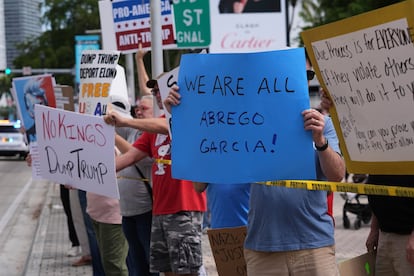Abrego García case exposes the injustices committed to carry out Trump’s mass deportation plan
The mistaken expulsion of the Salvadoran to Bukele’s mega prison sparked a standoff between the administration and the judiciary and became a political weapon


From the moment he took office, Donald Trump took action to fulfill one of his most popular campaign promises: the mass deportation of 13 million undocumented migrants. More than 100 immigration measures have changed the lives of millions of people who lived and worked in the U.S., both documented and undocumented, and who now fear expulsion. The government has sought to equate undocumented immigrants with criminals who pose a threat, but the reality is that most have no criminal record. The abuses committed by the executive branch under the guise of protecting the country have been epitomized by the case of Kilmar Abrego García, which has become a symbol of the injustices occurring with deportations and has led even the Supreme Court to rule on the matter, calling for his return.
Abrego García, a 29-year-old Salvadoran, has been held at the Terrorism Confinement Center (CECOT) in El Salvador since March 15. He is one of 23 Salvadorans who, along with 238 Venezuelans, were deported to the Central American country after being accused of belonging to MS-13, a Salvadoran criminal gang that Trump has defined as a terrorist group, along with Tren de Aragua, the Venezuelan gang to which others of those deported allegedly belong.
What makes Abrego García’s case stand out is that, for the first time, the government admitted that he was deported due to an “administrative error.” The detainee had been granted judicial protection since 2019, prohibiting his deportation. Despite this, the administration refused to try to correct its mistake and bring him back, leading to a standoff between the executive branch and the judiciary that has yet to be resolved.
The Trump administration argued that the detainee was already in the custody of Nayib Bukele’s government and that it could do nothing to return him to the United States. This argument has not been accepted even by the Supreme Court, which unanimously demanded that the government “facilitate” his return.
In return, Trump and his team have launched a smear campaign against Abrego García to justify his continued imprisonment, despite the fact that it has provided no evidence of criminal conduct. Abrego García has a clean criminal record.
Last Wednesday, U.S. District Judge Paula Xinis, who has overseen the case from the start, temporarily suspended her order requiring the government to explain its efforts to repatriate Abrego García. The pause came a day after she criticized the administration for refusing to provide information and is the first sign of a possible shift in tone in the legal battle.
Detained without reason
Abrego García was arrested on March 12 when he was traveling in his car with his five-year-old son, who is autistic, and was about to pick up his wife’s other two children. The five were a family living in Prince George’s County, Maryland. Immigration and Customs Enforcement (ICE) agents stopped his car and informed him that his status had changed. They detained him, and the family’s ordeal began. Without knowing the reason for his arrest, Abrego García was transferred to Florida, Georgia, and then Louisiana.
Agitated, on March 15, he told his wife, Jennifer Vásquez Sura, who is a U.S. citizen, that he believed he was being deported to El Salvador, to the mega-prison that Bukele built to house gang members, known for its deplorable conditions and human rights abuses.
Vásquez Sura recognized her husband from a published photo from inside the prison, thanks to the tattoos on his arm and the scars on his scalp, now visible due to the shaved head all prisoners are forced to have.
Since then, Vásquez Sura has become the most vocal advocate for his cause, leading protests and appearing before the media. In a statement to The Washington Post published last week, she said she and her children have had to move to a safe house because she is afraid. In its attempt to criminalize Abrego García, the Department of Homeland Security (DHS) shared old court documents with its 2.4 million followers on X that included her address.
“I don’t feel safe when the government publishes my address, the house where my family lives, for everyone to see, especially when this case has gone viral and people have all sorts of opinions,” she said. “So, this is definitely a bit terrifying. I’m scared for my kids.”
The DHS and White House press secretary Karoline Leavitt published a 2021 domestic violence complaint filed by Vásquez Sura on X, which she dismissed. She later explained that there were difficult times in their marriage, partly due to the depression Abrego García suffered after being arrested in 2019.
That is when Abrego García’s only run-in with the law dates to. He was arrested while waiting for a job as a day laborer outside a Home Depot store in Baltimore, Maryland, along with three other men. Federal officials accused him of being an active member of MS-13. No evidence was found, and no charges were filed against him. Six months later, a judge granted him a stay of deportation, which would protect him from being sent to El Salvador. The judge ruled that he was in danger if he returned to his country.
When he was 16, his family sent him to the United States, which he entered illegally, to escape the threats posed by gangs. His mother, who ran a business selling pupusas (a kind of flatbread), was the target of extortion by MS-13 and Abrego García was under significant pressure to join the gang.
A tattoo as proof
His family and lawyers have vehemently denied that he belongs to MS-13. Trump has appeared on X holding a photo of his hand with tattoos on the knuckles that the president says are proof of gang membership, although it has not been proven to be Abrego García’s.
The presence of tattoos is precisely one of the pieces of evidence the government uses to accuse detainees of gang membership, even though these designs are common in their countries of origin and cannot be considered irrefutable evidence, according to experts.
In addition to public outrage, the Abrego García case has become a political weapon against the government. Democratic Senator Chris Van Hollen of Maryland traveled to El Salvador on April 17 to meet with the detainee, and four Democratic members of Congress traveled to the Central American country this week to demand his release.
More cases
Although it has garnered the most headlines, the Abrego García case is not the only one that demonstrates the arbitrariness of deportations. District Judge Stephanie Gallagher, a Trump appointee, last week asked the administration to request the Salvadoran government release a 20-year-old Venezuelan man identified as Christian and return him to the United States, where he had judicial protection until his asylum request was resolved.
Christian was another of the men deported to El Salvador on March 15 under the Alien Enemies Act, which the government used to detain and expel migrants without the right to a trial or access to lawyers. Conceived in 1798 for situations of war, it has only been used three times, most recently during World War II.
The Supreme Court has temporarily blocked the application of this law and prohibited the government from using it to deport a group of Venezuelans held in a Texas detention center. This was in response to one of dozens of lawsuits filed by migrant advocacy organizations challenging the dubious legality of the government’s actions.
The impossible goal of a million
Since January 20, a barrage of measures have been implemented to meet the goal of expelling one million undocumented immigrants from the country annually. “The pace and intensity of migration events have been much greater than most people would have expected. Currently, we have 175 major actions. This exceeds the 94 during the first 100 days of the Biden administration and is six times the number of actions taken during the first Trump administration, which at the time appeared to be the most active migration-related in history,” emphasizes Doris Meissner, director of the Migration Policy Institute (MPI).
Visa revocations, the elimination of programs designed to provide legal avenues for migrants such as Temporary Protected Status (TPS) and humanitarian parole, and the elimination of CBP One, the app for scheduling appointments to apply for asylum, are some of the measures Trump has approved. These measures would increase the list of undocumented immigrants to some four million migrants who were residing legally and, if the courts don’t stop them (which they already have in some cases), will now be deportable.
A newly released MPI report explains that in his first 100 days, Trump 2.0 has drastically transformed the U.S. immigration system, but is failing to meet mass deportation targets. The Washington-based think tank estimates that half a million deportations could be achieved, half of the target.
For the deportation campaign to achieve its goal, Congress, now dominated by Republicans, must approve more funding for DHS and increase cooperation between local law enforcement and ICE.
What has been achieved is that the migrant community now lives in fear. People are leaving their jobs and children are stopping going to school for fear of encountering ICE agents. Many are considering leaving the country, something the government has promoted through the CBP Home app for self-deportations.
“We’re seeing a tremendous amount of fear and uncertainty in communities, and this is another tool for deportation,” says Murad Awawdeh, director of the New York Immigration Coalition.
Sign up for our weekly newsletter to get more English-language news coverage from EL PAÍS USA Edition
Tu suscripción se está usando en otro dispositivo
¿Quieres añadir otro usuario a tu suscripción?
Si continúas leyendo en este dispositivo, no se podrá leer en el otro.
FlechaTu suscripción se está usando en otro dispositivo y solo puedes acceder a EL PAÍS desde un dispositivo a la vez.
Si quieres compartir tu cuenta, cambia tu suscripción a la modalidad Premium, así podrás añadir otro usuario. Cada uno accederá con su propia cuenta de email, lo que os permitirá personalizar vuestra experiencia en EL PAÍS.
¿Tienes una suscripción de empresa? Accede aquí para contratar más cuentas.
En el caso de no saber quién está usando tu cuenta, te recomendamos cambiar tu contraseña aquí.
Si decides continuar compartiendo tu cuenta, este mensaje se mostrará en tu dispositivo y en el de la otra persona que está usando tu cuenta de forma indefinida, afectando a tu experiencia de lectura. Puedes consultar aquí los términos y condiciones de la suscripción digital.








































